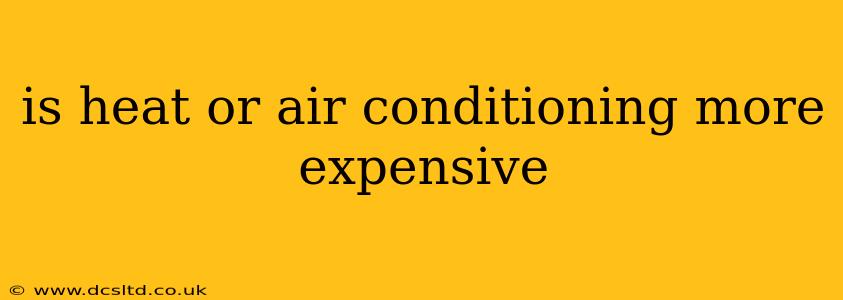The question of whether heating or cooling is more expensive is a common one, and unfortunately, there's no single definitive answer. The true cost depends on several interconnected factors, making a direct comparison complex. This article will delve into the key variables influencing the expense of heating and cooling your home, helping you understand which system might be more costly for you.
What Factors Determine Heating & Cooling Costs?
Before we compare heating and cooling directly, let's examine the elements that influence overall expenses:
-
Climate: Your geographic location significantly impacts energy consumption. A home in a consistently cold climate will naturally spend more on heating, while a home in a hot, humid climate will incur higher cooling costs. Mild climates might see more balanced expenses.
-
Home Size and Insulation: Larger homes require more energy to heat and cool, regardless of the system used. Proper insulation is crucial; poorly insulated homes lose heat in winter and cool air in summer, leading to increased energy consumption and higher bills.
-
System Efficiency: The efficiency of your heating and cooling systems is a major determinant of cost. Older, less efficient systems consume considerably more energy than newer, high-efficiency models. Look for Energy Star ratings for a reliable indicator of efficiency.
-
Fuel Type: Heating systems use various fuels, such as natural gas, propane, electricity, or oil. The price of these fuels fluctuates, directly impacting heating costs. Cooling systems primarily rely on electricity, with its price also subject to change.
-
Usage Patterns: How often you use your heating and cooling systems directly impacts energy consumption. Setting your thermostat wisely (e.g., slightly higher in summer and lower in winter when you're away) can significantly reduce your bills.
-
Maintenance: Regular maintenance of both heating and cooling systems is vital for optimal efficiency and longevity. Neglecting maintenance can lead to breakdowns, costly repairs, and higher energy usage.
-
System Type: The type of heating and cooling system itself plays a role. For example, heat pumps offer both heating and cooling capabilities, potentially reducing overall expenses compared to separate systems.
How Much Does Heating Typically Cost?
Heating costs are highly variable. Natural gas is often the most affordable fuel source, but its price fluctuates. Electricity is generally more expensive for heating, especially with older resistance heating systems. Propane and oil can also be more costly than natural gas, depending on local prices and market conditions. The cost per month can range from a few tens of dollars to several hundred, depending on the factors listed above.
How Much Does Air Conditioning Typically Cost?
Air conditioning costs are largely determined by electricity prices and the size and efficiency of your unit. Factors like the climate and your usage patterns heavily influence the monthly bill. Similar to heating, air conditioning expenses can range widely, from tens to hundreds of dollars per month.
Is a Heat Pump More Cost-Effective Than Separate Systems?
Heat pumps offer a compelling alternative to separate heating and cooling systems. They can provide both heating and cooling using electricity, often resulting in lower overall energy consumption and lower bills compared to using separate gas furnaces and air conditioners, particularly in milder climates. However, their efficiency can decrease in extremely cold climates.
What Can I Do to Reduce My Heating and Cooling Costs?
Regardless of which is more expensive in your situation, several strategies can significantly reduce your energy bills:
-
Improve Insulation: Proper insulation in walls, attics, and floors is crucial for minimizing energy loss.
-
Seal Air Leaks: Caulk and weatherstrip windows and doors to prevent drafts.
-
Upgrade to a High-Efficiency System: Consider replacing older, inefficient systems with newer, high-efficiency models.
-
Programmable Thermostat: Utilize a programmable thermostat to optimize temperature settings when you are home and away.
-
Regular Maintenance: Schedule annual maintenance for your heating and cooling systems to ensure they're operating efficiently.
Conclusion: It Depends!
The question of whether heating or air conditioning is more expensive is ultimately location and circumstance-specific. There's no universally correct answer. By carefully considering the factors discussed above – climate, home characteristics, system efficiency, fuel costs, and usage patterns – you can better estimate the likely expenses for your home and make informed decisions about energy consumption and cost management.
